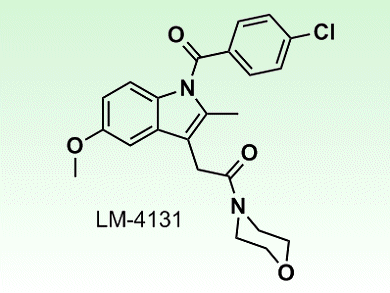Endocannabinoids (eCB) are brain lipids that attenuate pain, stress, and anxiety. Their pharmacological stimulation is an emerging approach for the treatment of anxiety disorders. Nevertheless, compounds that boost eCB activity in a selective manner are still lacking.
Daniel Hermanson, Vanderbilt University School of Medicine, USA, and colleagues reported a way around this issue. The scientists demonstrated that, in addition to synthesizing prostaglandins from arachidonic acid, the enzyme cyclooxigenase-2 (COX-2) oxygenates eCB, thereby reducing the levels of eCB in the brain. These results prompted the researchers to develop LM-4131 (pictured), a COX-2 substrate-specific inhibitor, which increases brain eCB levels without interfering with prostaglandin synthesis or affecting the levels of non-eCB lipids.
When administered to mice, LM-4131 exerted anxiolytic effects but did not cause gastrointestinal toxicity, a phenomenon often provoked by other COX-2 inhibitors. LM-4131 may, thus, represent a novel promising class of anxiolytic drugs.
- Substrate-selective COX-2 inhibition decreases anxiety via endocannabinoid activation,
Daniel J. Hermanson, Nolan D. Hartley, Joyonna Gamble-George, Naoko Brown, Brian C. Shonesy, Phillip J. Kingsley, Roger J. Colbran, Jeffrey Reese, Lawrence J. Marnett, Sachin Patel,
Nat. Neurosci. 2013.
DOI: 10.1038/nn.3480



